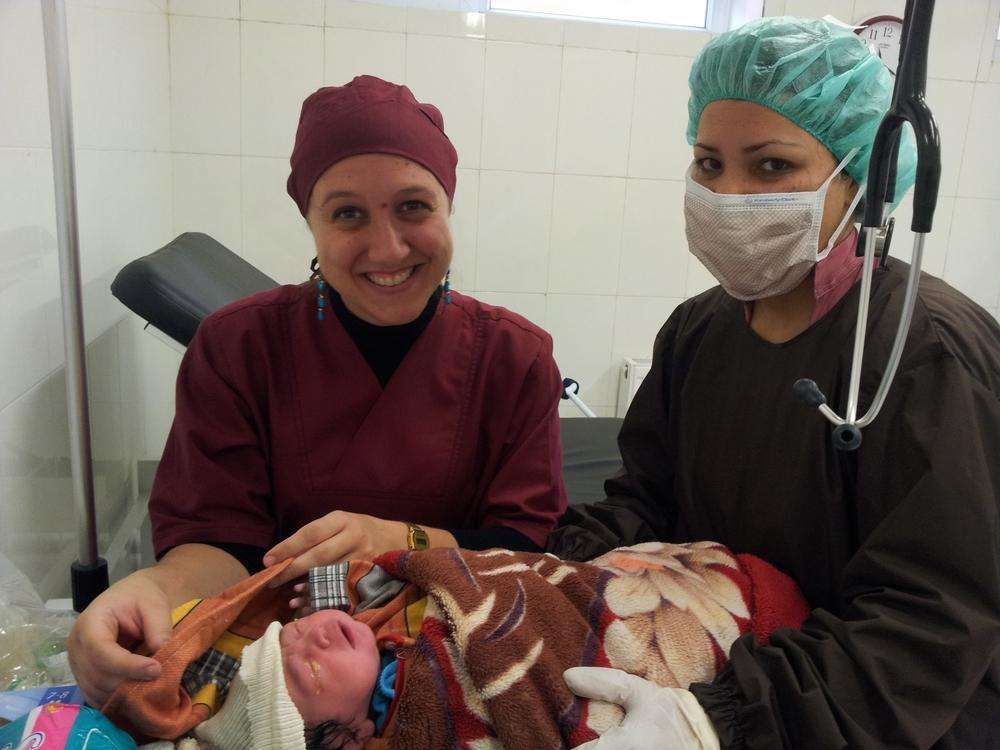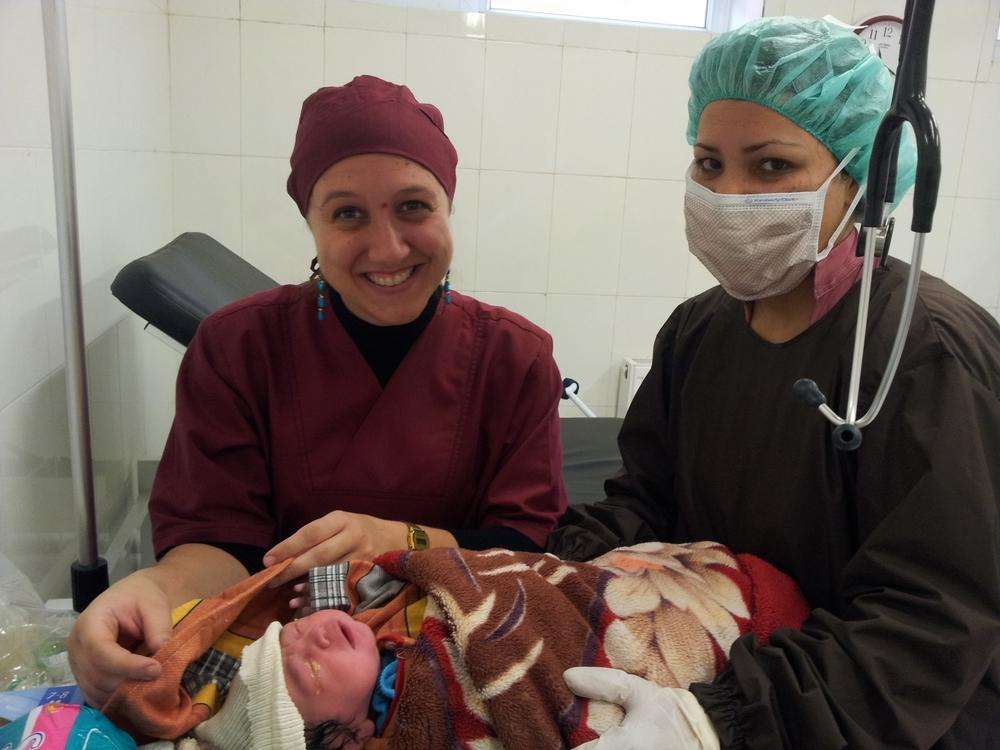From October 2014 to January 2015, pediatric nurse Elodie Barniet helped organize the opening of the Doctors Without Borders/Médecins Sans Frontières’s (MSF) maternity center at the hospital in Dasht-e-Barchi, one of the poorest neighborhoods in Kabul, the capital of Afghanistan. The maternity center includes a free neonatal intensive care unit (NICU) and kangaroo care unit—in which skin-to-skin contact with the mother warms the baby and helps with bonding—for managing potential complications. Here, Elodie recounts the ways the health center affects patients’ lives in a country where many families cannot ordinarily afford private care.
In Dasht-e-Barchi, the skies are clear in winter. Though it is cold, there is a lot of light and the snow-topped mountains can be seen in the distance. In the morning you can hear the call of the muezzin amidst the noise of the cars and motorbikes. Then the city wakes up, little by little, as the sun rises, along with the scent of spices and grilled meat from the market near the hospital.
It was there that I spent a little over three months on mission with MSF. I was there to help open a maternity center and a NICU with a “kangaroo” unit in the district hospital, in collaboration with the Afghan Ministry of Health. The NICU offers free care for low birth–weight and premature infants, infants with respiratory infections or fever, growth retardation, or those who cannot nurse. They are kept there until they gain enough weight to be discharged.
Due to a lack of facilities and cultural habit, more than half of Afghan women give birth at home. This type of medical care is therefore necessary, especially in case of complications. Moreover, a delivery can cost from 800 to 1,000 afghanis (around $14 to $17), and while that doesn’t seem like much, it’s an enormous amount for families that often live on 1 euro per day per person.
One of the objectives of my mission was to initiate the team in the kangaroo method, which is used for mothers whose infants are premature or show intrauterine growth retardation. It’s a simple treatment technique that puts babies in direct, skin-to-skin contact with their mother. The newborns are kept warm by their mother until they weigh enough (about four pounds) and are able to breastfeed, thus increasing their chances of survival.
More Than 30 Deliveries Per Day
By late January we had an average of 30 deliveries per day, 739 in January, though we had anticipated only 600 when we started! Fortunately the complication rate is at most 30 percent, because it’s hard to keep the women there for more than a few hours. They have to go home quickly to take care of the rest of the family.
The women are generally accompanied by their mother-in-law or mother, as well as by their husband or another man in the family. If there’s a complication, we need a man’s consent to perform a Caesarean [section]. That’s particularly the case when there’s a prolapsed umbilical cord, that is, when the cord comes out before the baby. When that happens, the head can compress the cord, cutting off the blood supply and thus the baby’s oxygen. That’s one of the emergency situations requiring a Caesarean.
One of the obstetric emergencies we treated was Janbakht*. She was a 28-year-old Afghan woman who had been trying to have a child for ten years. She had had several miscarriages and stillbirths. Her cervix was already fully dilated when she arrived. But the baby wasn’t breathing at birth. We resuscitated and ventilated him using CPR. After ten minutes the baby began to breathe. We transferred him to the NICU, where we kept him on oxygen and started an infusion.
Due to respiratory distress, the newborn couldn’t nurse. So for several days we “fed” him his mother’s milk by nasogastric tube. And though he was doing better, he was not waking up. Then finally, on the sixth day, he cried and opened his eyes. That was a moment of intense joy for his mother. We began giving him milk with a spoon. It took him another two weeks to be able to nurse on his own, but he still needed oxygen. Finally, on the twentieth day, he could breathe on his own and his mother, happy and proud, was able take him home.
Mothers Stay Only a Few Hours
Our midwives stay with the mothers during labor, talking to them and encouraging them right up to delivery. This can be very important in some cases.
One night, Azra* arrived at the MSF maternity center alone. She didn’t know where her husband was. She was exhausted and nervous, because she had to leave her two-year-old daughter at home by herself. Her cervix was fully dilated. The baby weighed more than four kilograms (about nine pounds).
At birth we discovered that he was at risk of hypoglycemia. This is often the case with infants born to diabetic mothers. The newborns produce a lot of insulin to regulate their glucose level, and so have to be fed a rich diet quickly so that they can continue to produce insulin with the same glucose intake. Since he could nurse, we gave him sugar water. We wanted to keep mother and infant under observation for at least 24 hours, but she had to leave to take care of her older daughter. So we gave her a warm meal and a few things for the baby and two hours later, with some trepidation, we watched her leave. She didn’t come back, so mother and infant must have recovered well.
The MSF maternity center at the Dasht-e-Barchi hospital has forty-two beds, ten of them in the NICU and five for the kangaroo unit. The team consists of thirty midwives, eight gynecologists, nine surgical nurses, four anesthesiologist assistants, twelve neonatal intensive care nurses, and three pediatricians. More than sixty other people (sterilization workers, maintenance people, translators, intake, information and administration staff, etc.) work alongside them. In all, nearly 170 Afghan staff and ten or so expatriates are dedicated to this MSF project. At Dasht-e-Barchi, MSF provides a unique service, free of charge, to the neighborhood women; we help them give birth safely.”
*Mothers’ names changed to protect anonymity.
In Afghanistan, MSF also works at the Ahmed Shah Baba hospital in eastern Kabul, and at the Boost hospital in Lashkargah, Helmand Province. The organization also runs a trauma hospital in Kunduz, offering surgical treatment to people in northern Afghanistan; and a maternity center in Khost, eastern Afghanistan. At all of these sites, MSF dispenses essential medical care free of charge. MSF’s activities in Afghanistan rely solely on private funding; no government aid is accepted.





